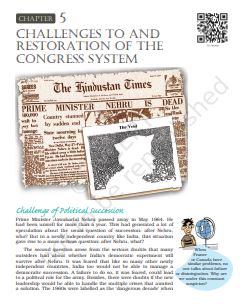‘NCERT Solutions for Class 12 Political Science Chapter 5‘ PDF Quick download link is given at the bottom of this article. You can see the PDF demo, size of the PDF, page numbers, and direct download Free PDF of ‘Ncert Class 12 Political Science Chapter 5 Exercise Solution’ using the download button.
NCERT Class 12 Political Science Textbook Chapter 5 With Answer PDF Free Download

Chapter 5: Challenges to and Restoration of the Congress System
Prime Minister Jawaharlal Nehru passed away in May 1964. He had been unwell for more than a year.
This had generated a lot of speculation about the usual question of succession: after Nehru, who?
But in a newly independent country like India, this situation gave rise to a more serious question: after Nehru, what?
The second question arose from the serious doubts that many outsiders had about whether India’s democratic experiment will survive after Nehru.
It was feared that like so many other newly independent countries, India too would not be able to manage a democratic succession.
A failure to do so, it was feared, could lead to a political role for the army. Besides, there were doubts if the new leadership would be able to handle the multiple crises that awaited a solution.
The ease with which the succession after Nehru took place proved all the critics wrong.
When Nehru passed away, K. Kamraj, the president of the Congress party consulted party leaders and Congress members of Parliament and found that there was a consensus in favour of Lal Bahadur Shastri.
He was unanimously chosen as the leader of the Congress parliamentary party and thus became the country’s next Prime Minister.
Shastri was a non-controversial leader from Uttar Pradesh who had been a minister in Nehru’s cabinet for many years.
Nehru had come to depend a lot on him in his last year. He was known for his simplicity and his commitment to principles.
Earlier he had resigned from the position of Railway Minister accepting moral responsibility for a major railway accident.
Shastri was the country’s Prime Minister from 1964 to 1966. During Shastri’s brief Prime Ministership, the country faced two major challenges.
While India was still recovering from the economic implications of the war with China, failed monsoons, drought and serious food crisis presented a grave challenge.
As discussed in the previous chapter, the country also faced a war with Pakistan in 1965 Shastri’s famous slogan ‘Jai Jawan Jai Kisan’, symbolized the country’s resolve to face both these challenges.
Shastri’s Prime Ministership came to an abrupt end on 10 January 1966, when he suddenly expired in Tashkent, then in the USSR, and currently the capital of Uzbekistan.
He was there to discuss and sign an agreement with Muhammad Ayub Khan, the then President of Pakistan, to end the war.
| Author | NCERT |
| Language | English |
| No. of Pages | 20 |
| PDF Size | 16.1 MB |
| Category | Political Science |
| Source/Credits | ncert.nic.in |
NCERT Solutions Class 12 Political Science Chapter 5 Challenges to and Restoration of the Congress System
l. Explain any two reasons for the popularity of Indira Gandhi during the 1971 elections.
Or
Analyse any three factors which enhanced the popularity of Indira Gandhi in the early 1970s.
Answer: Because:
1. Indira Gandhi campaigned to implement land reform legislation and land ceiling legislation during elections.
2. She ended her dependence on other political parties by strengthening her party’s position and recommended the dissolution of the Lok Sabha in December 1970.
3. The crisis in East Pakistan and Indo- the Pak war to establish Bangladesh as an independent one, also enhanced the popularity of Indira Gandhi.
2. What does ‘defection’ stand for in Indian politics? Highlight any two demerits of this practice?
Answer: Defection refers to an elected representative leaving the party on whose symbol he/she is elected and joining another party. This culture developed in Indian Politics after the 1967 elections.
Its two demerits were as follows:
1. It played an important role in making and unmaking government frequently.
2. The constant realignments and shifting political loyalties in this period gave rise to the expression “Aaya Ram, Gaya Ram”.
3. Why was the year 1967 considered a landmark year in India’s political and electoral history? Explain.
Answer: The fourth general election was held in 1967 for the first time without Nehru:
1. The election verdict was not in favour of Congress and the results jolted the Congress both at the national and state levels.
2. Half the ministers in Indira Gandhi’s cabinet were defeated including K. Kamraj in Tamilnadu, S.K. Patil in Maharashtra, Atulya Ghosh in West Bengal, K.B. Sahay in Bihar.
3. Congress did not lose a majority in seven states only but two other states also prevented it to form a government due to defections.
4. For the first time any non-Congress party secured a majority in any state and in the other eight states different non-Congress parties formed the coalitions.
4. These election results were called a ‘Political Earthquake’.4. How can we see the re-emergence of Indira Gandhi to power in 1971?
Answer: Congress (R) under Indira Gandhi had an issue, an agenda and a positive slogan which was lacking by its opponents. The ‘Grand Alliance’ had only one common programme ‘Indira Hatao’:
1. In contrast to this, Indira Gandhi put forward a positive slogan ‘Garibi Hatao’.
2. By this, she generated a support base among the poor, minorities, landless labourers, Dalit, women and unemployed youth.
3. Except it, she focused on the growth of the public sector, imposition of ceiling on rural land holdings and urban property, removal of disparity etc.
4. Thus, the slogan of Garibi Hatao and programmes became part of Indira Gandhi’s political strategy of building an independent nationwide political support base during the electoral contest of 1971.
Challenges to and Restoration of the Congress System NCERT Textbook With Solutions PDF Free Download
